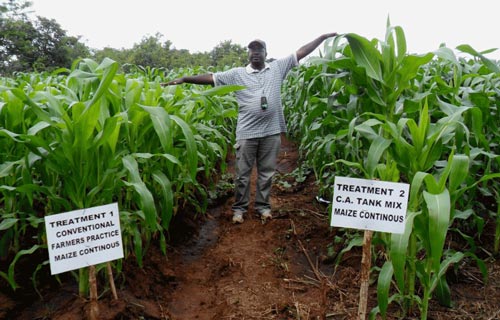 During 06-10 February 2012, a team of CIMMYT scientists travelled to six communities in Zambia’s Eastern Province to monitor progress on activities implemented under the Sustainable Intensification of Maize-Legume systems for the Eastern Province of Zambia (SIMLEZA) project, funded by USAID as part of Barack Obama’s “Feed the Future” initiative. The team was joined by national partners from governmental extension services, field coordinators from Total Land Care, Zambian researchers from Msekera Research Station, IITA, and CIP, and a group of farmers from Monze, in Zambia’s Southern Province. Journalists from two radio stations, one daily newspaper, and Zambian television covered the visit.
During 06-10 February 2012, a team of CIMMYT scientists travelled to six communities in Zambia’s Eastern Province to monitor progress on activities implemented under the Sustainable Intensification of Maize-Legume systems for the Eastern Province of Zambia (SIMLEZA) project, funded by USAID as part of Barack Obama’s “Feed the Future” initiative. The team was joined by national partners from governmental extension services, field coordinators from Total Land Care, Zambian researchers from Msekera Research Station, IITA, and CIP, and a group of farmers from Monze, in Zambia’s Southern Province. Journalists from two radio stations, one daily newspaper, and Zambian television covered the visit.
The SIMLEZA project began in October 2011 and exhibits a large variety of validation trials using improved maize and legume varieties, in conjunction with conservation agriculture (CA), to sustainably increase productivity on farmers’ fields. The validation trials currently demonstrate maize grown either as a sole crop, intercropped, or planted in full rotation with legumes. Farmers in the Eastern Province are excited about these new ways of farming; they want to shift from traditional, monocropped systems to more profitable crop rotations. In field discussions, farmers commended the other benefits of CA: Reductions in labor, effectiveness of weed control through judicious use of herbicides, increased moisture conservation, and reduced surface run-off and soil erosion. The project also has a strong emphasis on involving women in the extension of new technologies to improve their livelihoods.
Identifying a suitable market for alternative crops such as cowpeas or soyabeans remains a challenge in the Eastern Province, though the SIMLEZA project is addressing this by targeting bottlenecks in the value chain. Through involvement of agro-dealers, the availability of improved seed and markets for produce will be facilitated and processing skills will be enhanced. CIMMYT also collaborates with IITA scientists in this project to make use of their expertise in legume production and processing.
Currently the SIMLEZA project operates in six target communities, but it aims to impact 20,000 households in the Eastern Province by 2014.
 Capacity development
Capacity development 
